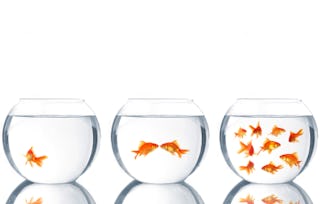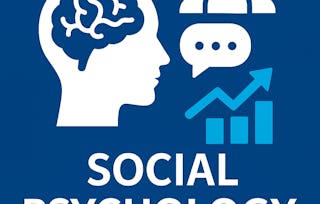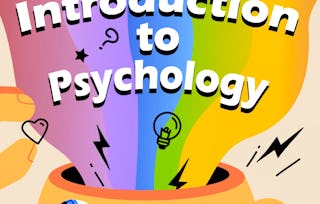This course introduces students to foundational areas in psychology across four key modules, including the biological basis of behavior, cognitive and emotional processes, theories of motivation and personality, and an introduction to psychological disorders. It offers students a basic yet comprehensive understanding of how psychological science explains thought, feeling, and behavior.

Introduction to Psychology

14 reviews
Recommended experience
What you'll learn
Explain key psychological theories in biological, developmental, personality, and social domains.
Identify major figures and schools that shaped psychology as a scientific field.
Use the scientific method in psychology: form hypotheses, collect data, and analyze results.
Analyze study findings and relate them to real-life behavior and mental processes.
Skills you'll gain
Details to know

Add to your LinkedIn profile
8 assignments
See how employees at top companies are mastering in-demand skills

There are 5 modules in this course
This course introduces students to foundational areas in psychology across four key modules, including the biological basis of behavior, cognitive and emotional processes, theories of motivation and personality, and an introduction to psychological disorders. It offers students a basic yet comprehensive understanding of how psychological science explains thought, feeling, and behavior. By examining essential psychological concepts and theories, students will begin to critically reflect on human behavior in various contexts. The course encourages the application of these insights to one’s own experiences, relationships, and broader social environments.
What's included
2 videos3 readings
Psychology emerged as a scientific discipline in the late 19th century, evolving from philosophy and biology with pioneers like Wilhelm Wundt, who established the first psychology laboratory in 1879. Early theories included structuralism, focusing on introspection, and functionalism, which emphasized the purpose of behavior. Over time, various perspectives developed—such as behaviorism, psychoanalysis, humanism, cognitive psychology, and the biological approach—each offering unique insights into human thought and behavior. Today, psychology integrates these diverse theories to better understand mental processes and improve well-being across individuals and communities.
What's included
5 videos1 reading2 assignments
Psychology research relies on systematic methods to study behavior and mental processes. Observation involves watching and recording behavior in natural or controlled settings to identify patterns without interfering. Correlational research examines the relationship between two variables, helping to predict outcomes but not determine cause and effect. Experimental methods involve manipulating one variable (independent) to observe its effect on another (dependent), allowing researchers to draw conclusions about causality under controlled conditions.
What's included
6 videos1 reading2 assignments
The study of brain and behavior explores how biological processes influence thoughts, emotions, and actions, as well as the role of genetics (nature) versus environment (nurture) in shaping behavior. Neurons, the brain’s communication cells, transmit information through electrical impulses and chemical signals, forming complex networks that underlie all mental activity. The brain is made up of specialized structures, including lobes like the frontal (planning and decision-making), parietal (sensory processing), occipital (vision), and temporal (hearing and memory).
What's included
5 videos1 reading2 assignments
The psychology of emotion, motivation, and stress examines how people experience feelings, what drives their actions, and how they respond to challenges. Emotions are complex reactions involving physiological arousal, expressive behavior, and conscious experience, influenced by both brain structures like the amygdala and social context. Motivation refers to the internal processes that initiate, direct, and sustain behavior, with theories like Maslow’s hierarchy of needs and drive-reduction theory explaining different types of motivation. Stress occurs when individuals perceive demands as exceeding their coping abilities, triggering physiological responses that can impact both mental and physical health.
What's included
5 videos1 reading2 assignments
Build toward a degree
This course is part of the following degree program(s) offered by O.P. Jindal Global University. If you are admitted and enroll, your completed coursework may count toward your degree learning and your progress can transfer with you.¹
Instructors


Offered by
Explore more from Psychology
 Status: Preview
Status: PreviewUniversity of Toronto
 Status: Preview
Status: PreviewO.P. Jindal Global University
 Status: Preview
Status: PreviewNational Taiwan University
 Status: Preview
Status: PreviewYale University
Why people choose Coursera for their career

Felipe M.

Jennifer J.

Larry W.

Chaitanya A.
Learner reviews
- 5 stars
71.42%
- 4 stars
28.57%
- 3 stars
0%
- 2 stars
0%
- 1 star
0%
Showing 3 of 14
Reviewed on Nov 20, 2025
I really enjoyed the knowledge and insights I gained from the course.
Reviewed on Oct 2, 2025
Very informative and well-designed assignments quizzes etc.

Open new doors with Coursera Plus
Unlimited access to 10,000+ world-class courses, hands-on projects, and job-ready certificate programs - all included in your subscription
Advance your career with an online degree
Earn a degree from world-class universities - 100% online
Join over 3,400 global companies that choose Coursera for Business
Upskill your employees to excel in the digital economy
Frequently asked questions
To access the course materials, assignments and to earn a Certificate, you will need to purchase the Certificate experience when you enroll in a course. You can try a Free Trial instead, or apply for Financial Aid. The course may offer 'Full Course, No Certificate' instead. This option lets you see all course materials, submit required assessments, and get a final grade. This also means that you will not be able to purchase a Certificate experience.
When you purchase a Certificate you get access to all course materials, including graded assignments. Upon completing the course, your electronic Certificate will be added to your Accomplishments page - from there, you can print your Certificate or add it to your LinkedIn profile.
Yes. In select learning programs, you can apply for financial aid or a scholarship if you can’t afford the enrollment fee. If fin aid or scholarship is available for your learning program selection, you’ll find a link to apply on the description page.
More questions
Financial aid available,

